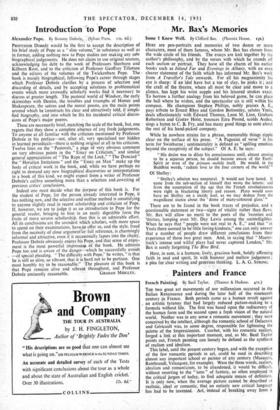Mr. Bax's Memories
Some I Knew Well. By Clifford Bax. (Phoenix House. US.) HERE are pen-portraits and memories of two dozen or more characters, most of them famous, whom Mr. Bax has chosen from the wide circle of his friends. The essays are knit together by the author's philosophy, and by the verses with which he rounds off each section or portrait. They have all the charm of his earlier books such as Inland Far and Evenings in Albany, with an even clearer statement of the faith which has informed Mr. Bax's work from A Traveller's Tale onwards. For all his magnanimity his eye is sharp: if an idol have but a toe of clay, he pinks it ; and the craft of the theatre, where all must -be clear and move to a climax, has kept his wrist supple and his leisured strokes exact. To borrow a further analogy from his beloved game, he can place the ball where he wishes, and the spectacular six is still within his compass. He champions Stephen Phillips, nobly praises A. E., pays tribute to Ernest Rhys and Gordon Bottomley, salutes Yeats, deals affectionately with Edward Thomas, Leon M. Lion, Graham Robertson and Gustav Hoist, trounces Ezra Pound, scolds Auden, sings a hymn to C. B. Fry, and has many good things to note about the rest of his hand-picked company.
While he nowhere strains for a phrase, memorable things ripple clear- on the surface of his prose. "A Paganini of verse" is his term for Swinburne ; sentimentality is defined as "spilling emotion beyond the receptivity of the subject." Of A. E.' he says: "His desire was to dilate his consciousness until, almost ceasing to be a separate person, he should become aware of the Earth- • Spirit or even of the primum -mobile itself. He would, in the Buddhist words, radiate love to the four corners of the world.'"
Of Shelley:
-" Shelley's atheism was unnatural. It would not have lasted. It came from the sub-section of himself that wrote the letters: and from the assumption of the age that the French revolutionaries were right in bracketing liberty and reason. Plato would soon have set Shelley on a steldy keel, as we may deduce from the magnificent stanze about the dome of many-coloured glass.'" There are to be found in the book traces of prejudice, and a questionable statement or two—signs of vitality rather than flaws. Mr. Bax will allow no merit to the poets of the 'twenties and 'thirties, lumping even Mr. Day Lewis among the unintelligibles. When he says that "people were not real to A. E.," and that "in Yeats there seemed to be little loving-kindnas," one can only answer that a number of people draw different conclusions from their experience of those two great men. And, in saying that " Maeter- linck's intense and wilful plays had never captured London," Mr. Bax is surely forgetting The Blue Bird.
Here, in sum, is a humane, lively, gracious book, boldly affirming faith in soul and spirit, lit with humour and mellow judgement ; a plea for clear writing and generous thinking. L. A. G. STRONG.






































 Previous page
Previous page